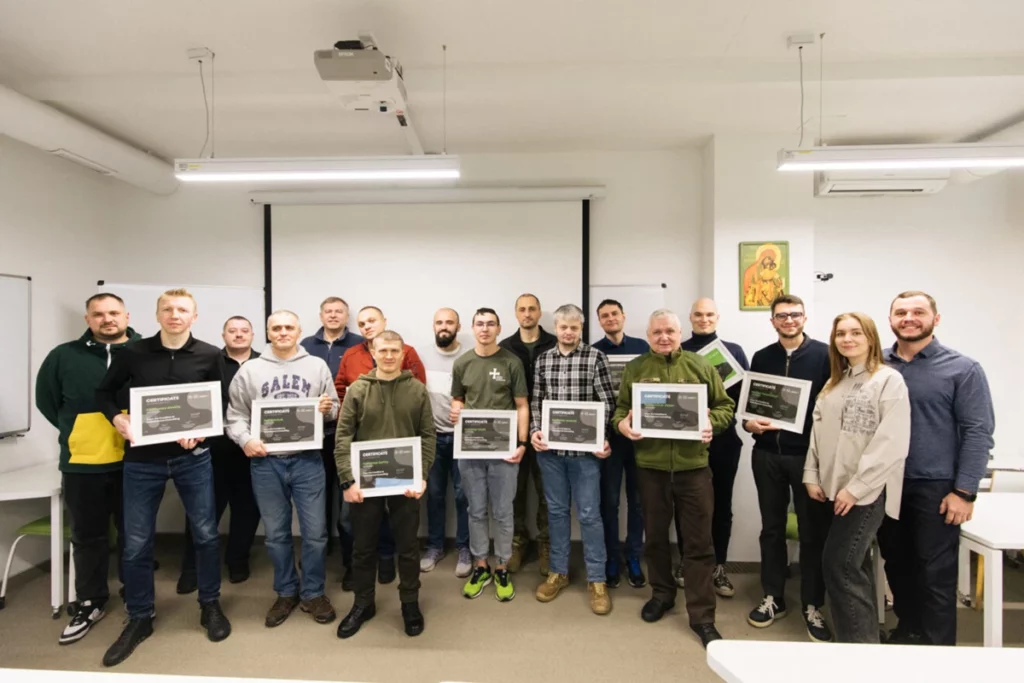According to UCU, in the future, the organisers plan to establish contacts with IT companies to take care of internship opportunities for graduates.
Participants had the opportunity to receive free training and learn the basics of data science methods and MLOps technologies to prepare themselves for the profession of a data science consultant.
More than 20 veterans and servicemen from all over Ukraine took part in the programme for veterans and military personnel “From the Frontline to Data Science Consulting”. For three months, they worked online with Dominik Deja, PhD, Head of Artificial Intelligence and Analytics at Capgemini Invent, a lecturer at the Polish-Japanese Academy of Information Technology (Warsaw). The participants were assisted by a team of ten mentors, graduates of the UCU Faculty of Applied Sciences.
Oleksiy Molchanovskyi, head of UCU’s Office of Innovation and one of the initiators of the programme, believes that scaling up this project would allow more participants to take advantage of educational opportunities and support: “We had more than 20 participants in this course, but we understand that the needs of society are much greater. Our methodology includes not only teaching, but also mentoring support and regular meetings with graduates. So now we are considering opening up access to training materials and methods so that other institutions can also use them. It is important to create the right infrastructure so that each participant can not only successfully complete the course, but also feel that they are taken care of afterwards.”
In the future, the organisers plan to establish contacts with IT companies to take care of possible internships for graduates.
Ruslan Partsei, the head of the Master’s programme in Data Science and one of the coordinators of the initiative for veterans, said that while preparing the programme, the faculty team tried to look for similar alternatives, but did not find any other courses aimed at veterans in the IT industry: “This course was the first or one of the few available for veterans, those who returned from combat or could not continue to participate in it, as well as for their families. The main idea behind our project was to help veterans rebuild their lives after returning from war. We wanted not only to provide them with a new profession, but also to help them with the process of adaptation.”
Serhii, a veteran and participant of the programme, says he enrolled in the course on the recommendation of a fellow veteran: “I’m an electrical engineer by profession, I work as a production foreman at a feed mill and head a service team. I had no experience in the IT industry. I was at the front for a year and a half, and now I’ve been discharged. This step for me is to dare to make qualitative changes.”
Serhii says that although the training was intense, he was inspired by the support from the course organisers and mentors: “The programme is very well designed. It takes participants from basic knowledge to more complex ones. Even for those who are afraid of drastic changes due to lack of experience, I advise them to try it.”
“Such educational programmes are definitely important, as they help to create horizontal connections and understand that you are not alone with your challenges. During the war, communication with people who have similar experiences creates a sense of unity. It is also a certain support for integration into society after the war,” says Bohdan, a soldier and alumnus of the programme.
Before the war, the man had experience in the IT sector, but needed to update his knowledge and change his field of work. Bohdan is convinced that studying at the programme is a challenge that allows veterans to change their lives: “There is nothing more difficult than war. So I want to tell those who are hesitant: try it and you will succeed. You have already gone through the worst, now only the best can happen.”

